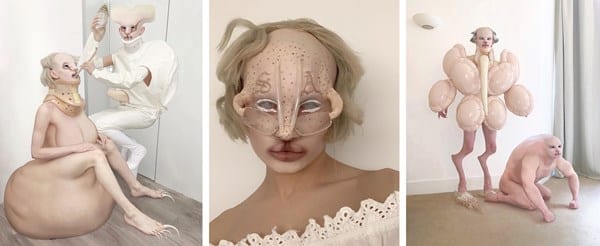Alien Beauty Invades World of Fashion | Fast Forward – OZY
Growing up in rural Wales, Salvia (who was assigned male at birth), never had any exposure to fashion outside of music videos and movies. Everyone around her told her that expressing herself through fashion was “stupid, self-absorbed and unnecessary,” she says. Teachers yelled at students if they wore makeup or nail polish or “if your skirt was too short,” Salvia says, who remembers being verbally and physically attacked. On one occasion, a group of kids bullied her “just because I straightened my hair.”
At 14, Salvia — who goes by that name on Instagram and doesn’t want to reveal her real name for privacy reasons — shaved off her eyebrows and then her hair. Now 18, Salvia, wears extreme makeup and often uses prosthetics to create an otherworldly look in the photos she posts on her feed. It’s her way of subverting the idea of traditional beauty that she was once bullied for. She’s not alone. Salvia is among an increasing number of fashion influencers and drag performers worldwide who are posing the latest challenge to the straight-jacketing prevalent in the beauty industry by popularizing a less human-looking aesthetic, bordering on typical Hollywood depictions of aliens. They’re using Instagram, the industry’s preferred social platform, to take its stereotypes head-on — and they’re attracting fast-growing interest.

Fecal Matter (@matieresfecales on Instagram), an account started by Montreal-based couple Hannah Rose Dalton and Steven Raj Bhaskaran in 2016, has 536,000 followers. Makeup artist Aryuna Tardis (@aryunatardis) offers alien beauty tips on her account, followed by 104,000 people. Seoul-born rapper and visual artist MLMA has 1 million followers on Instagram (@melovemealot). London-based performance artist and DJ Lewis G. Burton (@lewisgburton) has 11,000 followers.
Choosing to follow my instincts on how I should dress … is a big rebellion.
Salvia, alien beauty influencer
Drag artist Arran Shurvinton goes by the name of Nosferatu (@arranshurvinton), the vampire from the 1922 German expressionist classic, and has 20,000 followers on Instagram. Meanwhile, Salvia regularly offers her 316,000 Instagram followers new looks. In one recent post, she’s dressed as a bug, with eyes like slits, and strutting the streets with aplomb. In another, she sports a tail and a face that has nothing “human” about it.
“I think Instagram can create positive communities,” she says. “Choosing to follow my instincts on how I should dress and how I should create — and becoming successful and happy doing it — is a big rebellion [against] the control and manipulation … and also the misogyny and transphobia I faced growing up.”
A key reason why interest in alien beauty is growing fast, experts say, is because it questions the idea of the gender binary at a time many in broader society are finally also beginning to do the same. “The overlaps with drag are particularly interesting,” says Dr. Ruth Adams, senior lecturer at King’s College London, who has studied the phenomenon. She cites the examples of two top drag performers: American Nina Bo’nina-Brown and German Johannes Jaruraak, who goes by the stage name Hungry. Like Shurvinton, they both adopt otherworldly appearances for many of their performances.

Sure, French surrealist photographer Claude Cahun had explored this crossover between gender fluid identities and nonhuman aesthetics of beauty as early as 1928. And more recently, music artists have adopted alien subculture too: Check out South African hip-hop group Die Antwoord and Frankfurt-based Sopor Aeternus & the Ensemble of Shadows. But it’s only now, say industry insiders and experts, that isolated efforts have given way to what is a growing movement that is gaining traction.
The artists, performers and influencers driving alien fashion are using a combination of makeup, prosthetics and surgery to get the look they want. For many of them, personal experiences often served as the initial spark. It was Salvia’s gender dysphoria that pushed her to experiment and “distort my appearance.” For Steven Raj Bhaskaran of Fecal Matter, it was a gruesome incident that shook their faith. Born in Montreal to Sri Lankan and Guyanese parents, Bhaskaran one time witnessed a man throwing acid on the face of a woman. That made them decide to challenge the importance — and notions — of beauty, especially for those who they thought would never fit in. Salvia echoes the sentiment. “I don’t think we are taught to live in a way that is free or healthy.”
Burton, who identifies as nonbinary/gender-fluid and runs a queer techno and performance art club night in London, thinks the novelty and creativity behind alien beauty also has a broader appeal beyond just a social statement. “People are … bored of seeing mundane looks and want more and more extreme and creative things,” they say. Growing up in a small village on the outskirts of Newcastle upon Tyne in the U.K., Burton says they “spent a lot of my youth drawing.” One of their favorite fictional characters was Ursula, the sea witch from The Little Mermaid. “I’ve always been fascinated with her since a kid,” says the 27-year-old.

Practicing otherworldly fashion isn’t easy. Salvia says it can take between 30 minutes and three hours to apply makeup and prosthetics, some of which are inspired by sci-fi. Gender nonbinary communities across the world continue to face discrimination and even violence, so while social acceptance is growing, it’s unlikely that alien beauty will gain widespread mainstream acceptance anytime soon. Traditional norms of what constitutes beauty still remain entrenched.

For Burton, who grew up “large” and faced backlash for their size, alien culture is a rebellion against those mainstream notions. And the drag performers and influencers driving this trend are optimistic they will make a dent. “I hope that being exposed to my ideas and beliefs will make people question and challenge the way that we are taught to live,” says Salvia.
Let’s block ads! (Why?)

